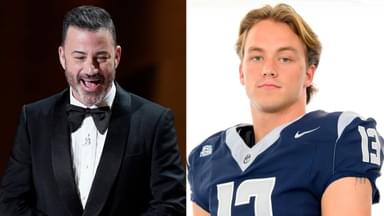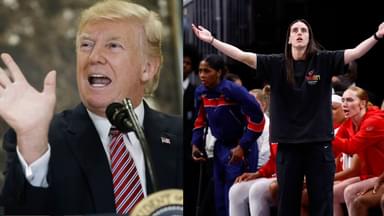Since assuming office for his second term, President Donald Trump has shown a keen interest in football, arguably more than any other sport. He made history as the first sitting president to attend the Super Bowl. Trump has also been outspoken with his views on college football. And now, he’s backing up his rhetoric with action.
Advertisement
Trump has announced plans to create a Presidential Commission on College Sports. And at the top of the list of people he has identified to lead the football side of that effort is Nick Saban.
Trump could soon appoint the seven-time national champion as the de facto commissioner of college football if he starts implementing his vision to reshape College Sports. Pat McAfee, who shared laughs and insights with Saban throughout the last college football season, has weighed in on the potential appointment.
The former Colts punter praised Saban’s deep understanding of the college game and his business acumen. He believes these are two qualities that make Saban uniquely qualified to lead such a commission.
“Coach Saban is a special special person. That’s why the rumors are coming out about him being part of it. If this were to happen, there would be no [one] better than this guy,” said McAfee.
But McAfee also acknowledged the monumental challenge ahead. In his view, reforming college football is nearly impossible, and anyone willing to take on that task is signing up for a big responsibility.
“But we do understand that it might be an impossible task too. That’s a huge undertaking that you are trying to do with college football. I just like the fact that it’s being thought about, and, if he is a part of it, great. But the fact that they are thinking about trying to figure this out, that’s the big news,” added McAfee.
College football insider Pete Thamel believes the goal of the proposed presidential commission would be to address the growing issues plaguing football. However, he argued these aren’t simple problems that can be fixed by a body created through executive order.
Tackling them will require extensive planning, legal expertise, logistical coordination, and input from industry professionals to navigate the complex landscape that lies beneath the surface. The commission will have to weigh factors such as labor laws, player contracts, and the role of higher education institutions.
Thamel said that he has seen many similar efforts over the years, all of which have failed to deliver meaningful change, ultimately wasting time and taxpayer dollars. He’s concerned this new initiative could meet the same fate.
“We all sit around and talk about problems, and they’re pretty obvious with college football. If these were easy issues to fix that didn’t weave through labor laws, TV contracts, and higher education, they would have been fixed by now,” said Thamel.
Thamel also emphasized that any ruling or recommendation from the commission would hold little weight unless Congress formally codifies it into law. Legal backing is essential, and lawyers would need to play a key role in legitimizing any reforms.
“What is known already is that this commission is not going to all of a sudden be gifted unilateral rights to change the whole landscape. Congress would still need to codify. There is a lot that is needed,” Thamel elaborated.
Pat McAfee echoed Thamel’s concerns, noting that reforming college football would require an enormous financial investment. In his words, it’s a “can of worms” that no one has been willing to open — until now.
This is a monumental undertaking, and anyone who steps up to lead it would need to commit fully. It definitely is not a part-time role. Finding more people like Saban who might be willing and able to take on such an enormous responsibility won’t be easy.
The NCAA has long been viewed as a powerless institution. When it does attempt to enforce rules, it often finds itself bogged down in lawsuits.
Many believe it’s time to dismantle the current structure and rebuild it for the modern era, introducing stronger, more relevant regulations, especially when it comes to the transfer portal and Name, Image, and Likeness (NIL) policies.
NIL has largely gone unchecked. While it was initially a tool for athlete empowerment, it has now turned into a free-for-all.
Players are actively using NIL deals and the transfer portal to gain playing time or financial rewards without putting in the necessary time and work. Athletes are increasingly exploiting the portal, even though its original intent was to give them more freedom and opportunity.
The list of necessary reforms is extensive, and any commission that fails to recognize the depth and complexity of these challenges risks becoming just another expensive, ineffective undertaking.








